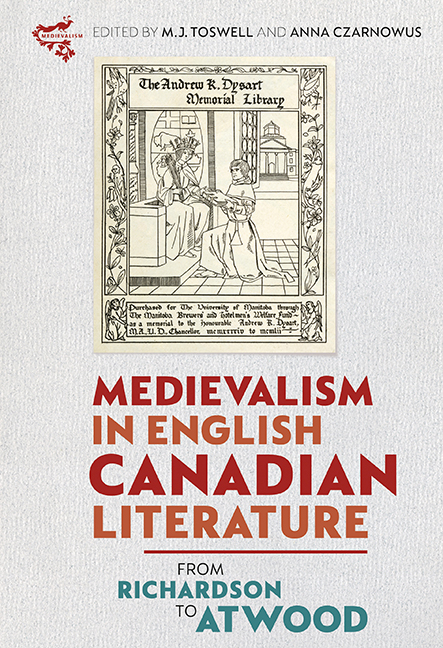Book contents
- Frontmatter
- Contents
- Introduction: English Canadian Medievalism
- 1 “Men of the North”: Archibald Lampman's Use of Incidents in the Lives of Medieval Monarchs and Aristocrats
- 2 “Going Back to the Middle Ages”: Tracing Medievalism in Julia Beckwith Hart's St. Ursula's Convent and John Richardson's Wacousta
- 3 John Richardson's Wacousta and the Transfer of Medievalist Romance
- 4 A Canadian Caliban in King Arthur's Court: Materialist Medievalism and Northern Gothic in William Wilfred Campbell's Mordred
- 5 Orientalist Medievalism in Early Canadian Periodicals
- 6 The Collegiate Gothic: Legitimacy and Inheritance in Robertson Davies's The Rebel Angels
- 7 Earle Birney as Public Poet: a Canadian Chaucer?
- 8 “That's what you get for being food”: Margaret Atwood's Symbolic Cannibalism 129
- 9 Lost in Allegory: Grief and Chivalry in Kit Pearson's A Perfect, Gentle Knight
- 10 Remembering the Romance: Medievalist Romance in Fantasy Fiction by Guy Gavriel Kay and Charles de Lint
- 11 Medievalisms and Romance Traditions in Guy Gavriel Kay's Ysabel
- 12 The Medieval Methods of Patrick DeWitt: Undermajordomo Minor
- Index
- Miscellaneous Endmatter
11 - Medievalisms and Romance Traditions in Guy Gavriel Kay's Ysabel
Published online by Cambridge University Press: 25 March 2020
- Frontmatter
- Contents
- Introduction: English Canadian Medievalism
- 1 “Men of the North”: Archibald Lampman's Use of Incidents in the Lives of Medieval Monarchs and Aristocrats
- 2 “Going Back to the Middle Ages”: Tracing Medievalism in Julia Beckwith Hart's St. Ursula's Convent and John Richardson's Wacousta
- 3 John Richardson's Wacousta and the Transfer of Medievalist Romance
- 4 A Canadian Caliban in King Arthur's Court: Materialist Medievalism and Northern Gothic in William Wilfred Campbell's Mordred
- 5 Orientalist Medievalism in Early Canadian Periodicals
- 6 The Collegiate Gothic: Legitimacy and Inheritance in Robertson Davies's The Rebel Angels
- 7 Earle Birney as Public Poet: a Canadian Chaucer?
- 8 “That's what you get for being food”: Margaret Atwood's Symbolic Cannibalism 129
- 9 Lost in Allegory: Grief and Chivalry in Kit Pearson's A Perfect, Gentle Knight
- 10 Remembering the Romance: Medievalist Romance in Fantasy Fiction by Guy Gavriel Kay and Charles de Lint
- 11 Medievalisms and Romance Traditions in Guy Gavriel Kay's Ysabel
- 12 The Medieval Methods of Patrick DeWitt: Undermajordomo Minor
- Index
- Miscellaneous Endmatter
Summary
THE CHARACTER OF fantasy literature has changed to a great extent since the nineteenth-century publication of those pioneering stories now considered fantasy, such as George MacDonald's Phantastes: A Faerie Romance for Men and Women (1858) or William Morris's The Well at the World's End (1896), the latter creating for the first time an independent fantasy world. Nonetheless, despite all the transformations to which fantasy fiction has been subjected, it retains a profound connection with a medievalist aesthetics. Fantasy literature, indebted to recurring themes and traditions of the Middle Ages, has developed on the structural foundation of medieval myths and legends, chansons de geste, and chivalric romances. By consequence, elements such as chivalric exploits or magical phenomena are frequent in the genre. Any attempt to reveal the sources of magical stories points to “the ancient traditions of tales of marvels and wonders,” which “continued in the Middle Ages in the form of the romance.” Moreover, magic, widely associated with fantasy, was profusely employed by their authors to accompany medieval narratives, possibly “in order to encourage their audiences toward a multi-level interpretative engagement with the text.” With Arthurian romances and legends constantly influencing the genre, for example in such contemporary mutations as Marion Zimmer Bradley's Avalon series, medieval modes continue to constitute a rich source of inspiration and of useful devices applied in fantasy texts, especially in the context of the Gothic, which “ushered in the nineteenth-century cult of the medieval.”
Reminiscences of the Middle Ages were constantly present in the later periods, thus strengthening the importance of its imagery in subsequent literatures, including fantasy. This tendency to perpetuate a medieval aesthetics in fiction perhaps diminished over time, and ultimately, “medievalism found refuge in fantasy literature.” A significant number of fantasy stories focus on technologically underdeveloped locations inhabited by heroes who perform glorious deeds and are involved in sword-fights and magic, which readers associate with uncomplicated images of the medieval period. Therefore, because general knowledge of the media tempora is strictly limited to these simplified, if not false, concepts, the representation of this part of history and its presence in the genre tends on the whole to be trivialized.
- Type
- Chapter
- Information
- Medievalism in English Canadian LiteratureFrom Richardson to Atwood, pp. 172 - 188Publisher: Boydell & BrewerPrint publication year: 2020



